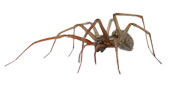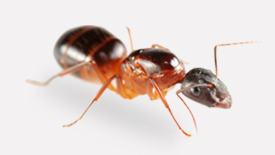Pests in Hamilton
Hamilton residents are confronted by a variety of pests. Rainy weather can bring millipedes, earwigs, and pillbugs indoors. Rodents such as mice are also moving indoors this season looking for a dry and safe place. Here are some common pests that are currently affecting the Hamilton area.
Brown Recluse Spider

Brown recluse spiders are usually between 6-20 mm and are typically a light to medium brown color. Each female will produce several egg sacs over a period of two to three months, usually in the spring. Each sac contains roughly fifty eggs and will hatch within a month. Brown recluse spiders are resilient and can tolerate up to six months of extreme drought or absence of food.
Brown recluse spiders build asymmetrical webs frequently found in basements, garages, closets, woodpiles, sheds, and other dry places.
Mayfly
Mayfly, or shadfly, is a fragile, soft-bodied insect found in Canada. Eggs are often deposited in clean, flowing water with a larval phase lasting from a few months to two years, depending on the species. The adult phase is short-lived, lasting from a few minutes to a few days, depending on the species. Most species feed on algae or diatoms. They are common in the Hamilton area.
Carpenter Ants

Carpenter ants are considered destructive pests in Canada. Two common species of carpenter ants found in Canada are Modoc and Vicinus. Modoc’s are all black with rusty red legs. Vicinus have a black head, rusty red thorax and black abdomen. Carpenter ants vary in size and can be as small as a quarter inch or as large as three quarters of an inch.
Carpenter ants establish their nest in decaying wood, but once established the ants extend their tunneling into sound wood, causing considerable damage to the structure. When colonies grow larger and need room to expand, satellite colonies are established. These satellite colonies are often found in nearby structures that offer warm protection.
As the weather begins to warm up in Hamilton, it is important to prepare for the pests that will inevitably be trying to find refuge in your home. Contact your local Truly Nolen pest professional for a consultation and to discuss your home’s unique needs.